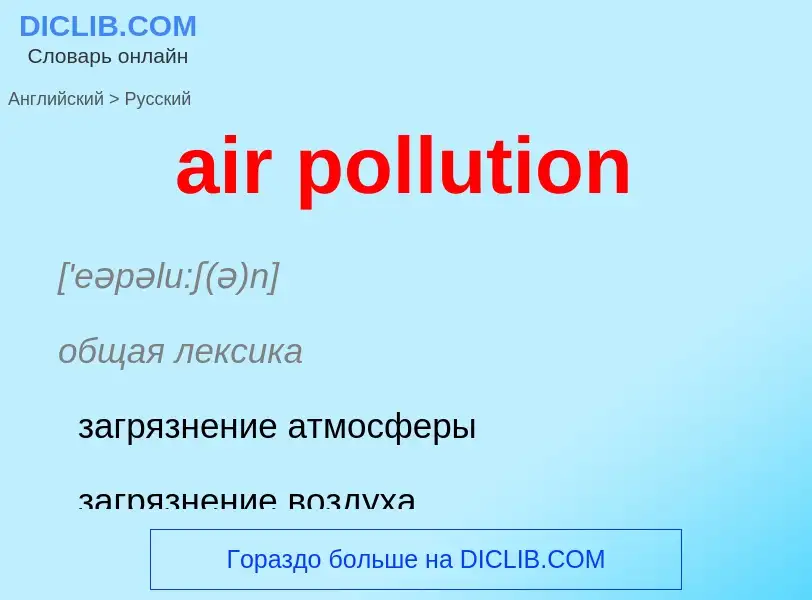Перевод и анализ слов искусственным интеллектом ChatGPT
На этой странице Вы можете получить подробный анализ слова или словосочетания, произведенный с помощью лучшей на сегодняшний день технологии искусственного интеллекта:
- как употребляется слово
- частота употребления
- используется оно чаще в устной или письменной речи
- варианты перевода слова
- примеры употребления (несколько фраз с переводом)
- этимология
air pollution - перевод на Английский
['eəpəlu:ʃ(ə)n]
общая лексика
загрязнение атмосферы
загрязнение воздуха
атмосферы
синоним
общая лексика
загрязненный воздух
медицина
загрязняющее воздух вещество
общая лексика
свежий воздух
чистый воздух
общая лексика
среда воздушная
Определение
Википедия

Air pollution is the contamination of air due to the presence of substances in the atmosphere that are harmful to the health of humans and other living beings, or cause damage to the climate or to materials. It is also the contamination of indoor or outdoor surrounding either by chemical activities, physical or biological agents that alters the natural features of the atmosphere. There are many different types of air pollutants, such as gases (including ammonia, carbon monoxide, sulphur dioxide, nitrous oxides, methane and chlorofluorocarbons), particulates (both organic and inorganic), and biological molecules. Air pollution can cause diseases, allergies, and even death to humans; it can also cause harm to other living organisms such as animals and food crops, and may damage the natural environment (for example, climate change, ozone depletion or habitat degradation) or built environment (for example, acid rain). Air pollution can be caused by both human activities and natural phenomena.
Air quality is closely related to the earth's climate and ecosystems globally. many of the contributors of air pollution are also sources of greenhouse emission i.e., burning of fossil fuel.
Air pollution is a significant risk factor for a number of pollution-related diseases, including respiratory infections, heart disease, COPD, stroke and lung cancer. [Growing evidence suggests that air pollution exposure may be associated with reduced IQ scores, impaired cognition, increased risk for psychiatric disorders such as depression and detrimental perinatal health.] The human health effects of poor air quality are far reaching, but principally affect the body's respiratory system and the cardiovascular system. Individual reactions to air pollutants depend on the type of pollutant a person is exposed to, the degree of exposure, and the individual's health status and genetics.
Outdoor air pollution attributable to fossil fuel use alone causes ~3.61 million deaths annually, making it one of the top contributors to human death, with anthropogenic ozone and PM2.5 causing ~2.1 million. Overall, air pollution causes the deaths of around 7 million people worldwide each year, or a global mean loss of life expectancy (LLE) of 2.9 years, and is the world's largest single environmental health risk, which has not shown significant progress since at least 2015. Indoor air pollution and poor urban air quality are listed as two of the world's worst toxic pollution problems in the 2008 Blacksmith Institute World's Worst Polluted Places report. The scope of the air pollution crisis is large: 90% of the world's population breathes dirty air to some degree. Although the health consequences are extensive, the way the problem is handled is considered largely haphazard or neglected.
Productivity losses and degraded quality of life caused by air pollution are estimated to cost the world economy $5 trillion per year but, along with health and mortality impacts, are an externality to the contemporary economic system and most human activity, albeit sometimes being moderately regulated and monitored. Various pollution control technologies and strategies are available to reduce air pollution. Several international and national legislation and regulation have been developed to limit the negative effects of air pollution. Local rules, when properly executed, have resulted in significant advances in public health. Some of these efforts have been successful at the international level, such as the Montreal Protocol, which reduced the release of harmful ozone depleting chemicals, and the 1985 Helsinki Protocol, which reduced sulphur emissions, while others, such as international action on climate change, have been less successful.


![2016 [[Environmental Performance Index]] – darker colors indicate lower concentrations of [[fine particulate matter]] and [[nitrogen dioxide]], as well as better [[indoor air quality]]. 2016 [[Environmental Performance Index]] – darker colors indicate lower concentrations of [[fine particulate matter]] and [[nitrogen dioxide]], as well as better [[indoor air quality]].](https://commons.wikimedia.org/wiki/Special:FilePath/2016 EPI Environmental Health Objective - Air Quality (26170609658).jpg?width=200)




![[[Beijing]] air in 2005 after [[rain]] (left) and a smoggy day (right) [[Beijing]] air in 2005 after [[rain]] (left) and a smoggy day (right)](https://commons.wikimedia.org/wiki/Special:FilePath/Beijing smog comparison August 2005.png?width=200)

![Georgia]], in preparation for spring planting Georgia]], in preparation for spring planting](https://commons.wikimedia.org/wiki/Special:FilePath/BurningOffFieldsInTheEveningInSouthGeorgia.jpg?width=200)
![Smog in [[Cairo]] Smog in [[Cairo]]](https://commons.wikimedia.org/wiki/Special:FilePath/Cairo in smog.jpg?width=200)


![Dust storm approaching [[Stratford, Texas]], in 1935 Dust storm approaching [[Stratford, Texas]], in 1935](https://commons.wikimedia.org/wiki/Special:FilePath/Dust Storm Texas 1935.jpg?width=200)



![Support, use and infrastructure-expansion of forms of [[public transport]] that do not cause air pollution may be a critical key alternative to pollution. Support, use and infrastructure-expansion of forms of [[public transport]] that do not cause air pollution may be a critical key alternative to pollution.](https://commons.wikimedia.org/wiki/Special:FilePath/NET tram 201-03.jpg?width=200)
![Air quality monitoring, [[New Delhi, India]] Air quality monitoring, [[New Delhi, India]]](https://commons.wikimedia.org/wiki/Special:FilePath/New Delhi Met Office, India 02.jpg?width=200)

![Before [[flue-gas desulfurization]] was installed, the emissions from this power plant in [[New Mexico]] contained excessive amounts of [[sulfur dioxide]]. Before [[flue-gas desulfurization]] was installed, the emissions from this power plant in [[New Mexico]] contained excessive amounts of [[sulfur dioxide]].](https://commons.wikimedia.org/wiki/Special:FilePath/Air pollution by industrial chimneys.jpg?width=200)
![[[Thermal oxidiser]]s are air pollution abatement options for [[hazardous air pollutant]]s (HAPs), [[volatile organic compounds]] (VOCs), and odorous emissions. [[Thermal oxidiser]]s are air pollution abatement options for [[hazardous air pollutant]]s (HAPs), [[volatile organic compounds]] (VOCs), and odorous emissions.](https://commons.wikimedia.org/wiki/Special:FilePath/Thermal-oxidizer-rto.jpg?width=200)
